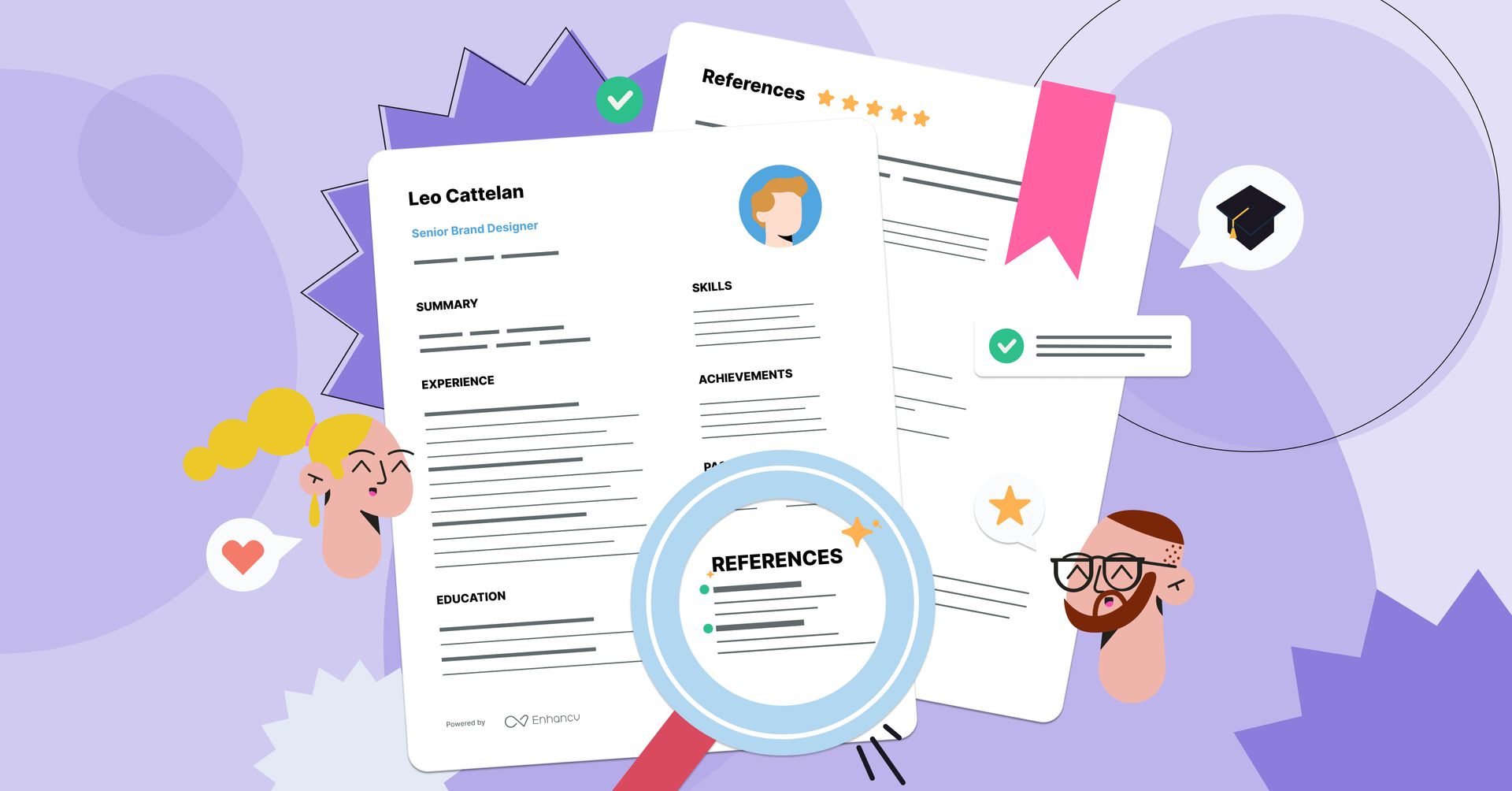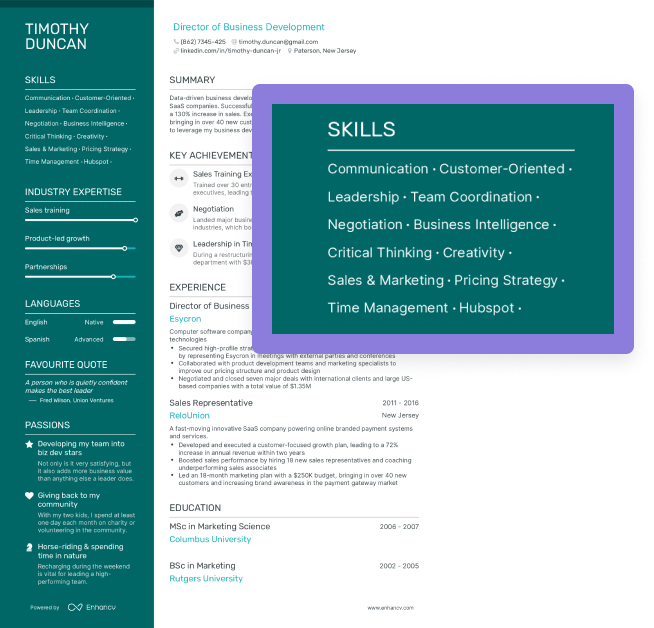“References available upon request.”
Heard of this one? The trite, superfluous phrase was all the rage decades ago. In today's job market, it’s often seen as redundant. Resumes are better used to highlight direct skills and experiences. However, when you write a resume, there are still circumstances where including references is advantageous.
In this article, we’ll discuss the pros and cons of adding references to your resume, and answer common questions, such as how to list them and whether friends can be your references.
Let’s dive in.
Key takeaways
- Avoid listing references on your resume unless required—prioritize showcasing skills and achievements instead.
- If references are necessary, list them at the end of your document, with names and essential contact information.
- Select people who can credibly endorse your work, such as former supervisors, colleagues, or mentors.
- Request references politely, provide job details, ensure the reference is comfortable endorsing you, and always express gratitude.
- Use references from the last two to three jobs or within the past five years for the most relevant insights into your abilities.
- If lacking professional references, consider academic advisors or community leaders, and clearly explain this choice to potential employers.
What are resume references?
Think of references on a resume as Google reviews for your professional personality. They’re testimonials from people who can vouch for your skills, work ethic, and character in a professional setting. The word “reference” is also used for the person providing the testimonial. This could be a colleague, a boss, or a mentor.
Additionally, similar to LinkedIn endorsements, these references support your skills and competencies, providing potential employers with a peer-validated backdrop to your professional claims. This helps contextualize your abilities in a world where digital credibility is as crucial as the real-world kind.
Should I put references on my resume?
Generally, you shouldn’t put references directly on your resume unless the job listing explicitly asks for them. Most of the time, the space is better used to showcase your achievements and skills.
Think of it this way: employers usually reach out to references later in the hiring process, when they’re seriously considering you for the role. So, keep yours at the ready, but let your resume focus fully on what makes you a standout candidate.
How to list references on a resume
If you’re wondering where references go on the resume, the best choice is at the bottom of your document.
Provide only essential contact info, like so:
This reference example is made with the Enhancv builder. It’s super easy to use, and a reliable tool to create your resume.
Try it out now!
Is your resume good enough?
Drop your resume here or choose a file. PDF & DOCX only. Max 2MB file size.
You can also add references on a separate page linked to your resume. Label this page “References” and list each reference’s name, title, company, and contact information, ensuring it matches the template, colors, and fonts of your resume for a cohesive look. Place a clearly visible link to the references page, such as in your resume header, to ensure easy access.
How employers use references
A striking 95% of US businesses perform background checks, which can include contacting references to verify that your qualifications are as solid as they appear. So, it’s wise to keep your references readily accessible, just in case.
Who to put as a reference on a resume?
When choosing references for your resume, rely on people who know you well and are familiar with your work. Make sure they’ll speak positively and convincingly about your professional abilities and character.
Here are a few options you might consider:
- Former supervisors: They can provide insights into what you’re like as an employee, how you navigate through different challenges, as well as whether you’re adaptable and reliable.
- Colleagues: Teammates or peers can testify to your teamwork, interpersonal skills, and daily work habits, such as how your coffee runs saved many a Monday morning.
- Mentors: Individuals who have watched your growth from the sidelines can highlight the strides you’ve made under their wing, from rookie to pro.
- Academic advisors or professors: These contacts can talk about that time you aced a complex project or led a seminar that left everyone buzzing.
Did you know college counselors are among the top sources people turn to for work advice?
How to ask for a reference
To ask someone to be your reference effectively, consider following these steps:
- Choose the right person: Ensure the person you choose can provide a positive and informed account of your work ethic, skills, and accomplishments.
- Ask politely and personally: Reach out via a personal phone call or an email where you can explain why you’ve chosen them as a reference.
- Provide necessary information: Give them an update on your career, the job you’re applying for, and why you think they're a suitable reference. Include your current resume and the job description.
- Request permission: Clearly ask if they feel comfortable providing a reference for you.
- Show gratitude: Thank them for considering your request, regardless of whether they agree.
FAQs about resume references
Still have some questions? We’ve probably covered them below:
Can I put friends as references?
If a friend can provide a strong testimony about your abilities in a work-related context, such as a project or job where you both were involved professionally, it might be acceptable. Otherwise, it’s best to choose supervisors, colleagues, or mentors who have seen your professional abilities first-hand.
How far back can references go?
When determining how far back your references should go, focus on relevance rather than a specific timeframe. Generally, references from your last two or three positions are most useful because they provide the most current insights into your skills and professional standards.
Ideally, try to keep references within the last five years. Beyond this period, people may not recall details accurately, making it harder to provide specific and useful information about your performance.
Can you be denied a job because of references?
On rare occasions, you can be denied a job based on references. This is why it’s critical to carefully select people who can vouch positively and accurately for your professional skills and character. If you face rejection, use it as an opportunity to reassess your reference list and ensure you maintain good relationships with former colleagues.
What’s the difference between references and testimonials?
Testimonials are general endorsements from clients or customers, demonstrating satisfaction with your service or performance. References, on the other hand, are detailed assessments from supervisors, colleagues, or mentors, specifically requested to provide insight into your work values, skills, and suitability for a position.
What if you don’t have any references?
If you don't have any professional references, consider alternatives such as former teachers, community leaders, or any other non-family members who can attest to your reliability, skills, and character. Explain the situation to potential employers, providing a clear context for the unconventional references, which can still effectively endorse your potential and work ethic.
Keep in mind, though, that for executive or higher-level positions, professional references can be crucial, and lacking them could weaken your application.
How do I secure references before leaving a job or university?
Secure references before leaving a job or university by asking supervisors, colleagues, or mentors who know your work well. Explain your future plans, ask if they’re comfortable providing a reference, and thank them for their support.
Conclusion
Typically, you shouldn't put references on a resume unless specifically requested. Save that space for your skills and achievements, keeping references ready for when they're asked for later in the hiring process.
Make one that's truly you.





